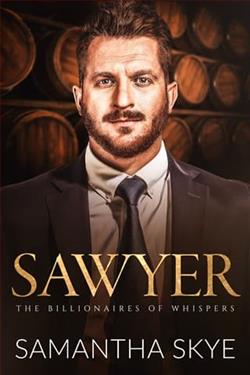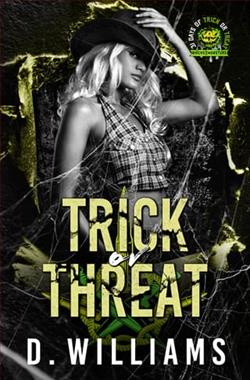Page 1 of The Forever Man (W.A.R.P. 3)
For all the time travellers who followed me into the wormhole
Need to Know
Towards the end of the twentieth century, quantum physicist Professor Charles Smart figured out how to construct tunnels from exotic matter with negative energy density. Simply put, Smart managed to access wormholes into the past at various quantum soft points. And, like almost every invention in the history of humankind, this one was quickly exploited by powerful people for their own greedy and violent ends. In this case the FBI established the Witness Anonymous Relocation Programme to stash federal witnesses in the past. This was an idea so monumentally complicated and expensive that it was doomed to catastrophic failure. And fail WARP did when the military tried to take over the programme, and Charles Smart disappeared into the past, taking his secrets with him.
Consequences of the collapse of the WARP initiative included but were not limited to:
the loss of billions of dollars’ worth of equipment at WARP sites through the centuries
the stranding of several witnesses and their handlers in various historic eras
the setting-loose of Albert Garrick, a psychotic Victorian assassin, in modern London, where he cut a bloody swathe through the city
The unleashing of Colonel Clayton Box into nineteenth-century London, where he very nearly succeeded in using his futuristic weapons to overthrow Parliament – and he would have done it too if not for two darned kids, namely:
Chevron Savano, a Shawnee FBI juvenile consultant who travelled to the past to fix the future, which was even more complicated than it sounds, and
Riley, a Victorian orphan who managed to strand his genuinely evil master, the assassin Albert Garrick, in the time tunnel before being instrumental in foiling Colonel Box’s plan, which was quite the pair of accomplishments for a fourteen-year-old boy with nothing at his disposal but quick wits and an expertise in stage magic.
No need for newcomers to the story arc to worry about the nitty-gritty. All you need to know is that our two uniquely talented and resourceful teenagers have just discovered that Riley’s long-lost half-brother, Tom, has been imprisoned in Newgate Prison and they have rushed over there to liberate him.
I think you can probably guess that things are going to go disastrously awry and much deadly danger will ensue.
Don’t fret – there are laughs too, and japes.
But I should not mislead: it’s mostly deadly danger.
So, if you are of a sensitive disposition, abandon ye this volume now and find for yourself a book about ponies or the like.
You have been warned.
Also ‘ye’ is just an old word for ‘you’, so ‘abandon you this volume now’ is what I meant to say.
I was going for a mood.
for more ebooks visit: www.nerdebooks.com
Download Speed
Professor Charles Smart.
Smart by name, smart by nature?
The man who opened the Einstein–Rosen bridge (that’s a wormhole to you and me) and understood as much about it as a chimp does the molecular composition of the banana it has just peeled. Charles Smart poked a hole in the banana peel and then tossed people in there, hoping they would come out intact at the other end. In fairness to the professor, most did, but some were changed utterly. There were a few positive changes – such as the time FBI Special Agent Cody ‘Cue-Ball’ Potter got his hair back, or when stumpy little Jerry Townsend went in five feet one and came out six feet three – but most of the mutations could be judged as negative. Men got spliced with animals: there were dog-men, monkey-men and, on one particularly memorable occasion, a tyrannosaur-guy. Time travellers picked up tumours and lesions and third-degree burns in all sorts of sensitive areas. Doctor Marla DeTroit, who funnily enough was from Detroit, went into the time tunnel a statuesque thirty-something lady and came out a bent-over octogenarian guy. This shook people up even more than the dinosaur incident. And, with every fresh wacky episode, the folk involved realized how little they understood the giant animal they were poking with a sharp stick.
Professor Smart himself said it best: You want to know how much we know about time travel? Let me put it this way: if we imagine the quantum network to be a giant interlocking system – something like the London Underground, for example – then we are just a swarm of ants who happened to fall through a grate on to one of the tracks.
Not exactly a vote of confidence. And this is from the big cheese himself. The man who was running the show.
The point being that there were things about the wormholes that Smart could not possibly have known when he hacked into one. There were consequences that the professor could never have foreseen, but as a proud Scotsman he should at least have remembered the lesson taught to him on his pappy’s knee: Nothing is free in this world, Charley boy. Nothing is even cheap. Everything will cost you dearly.
Pappy Smart was right. Everything must be paid for eventually, and Mother Nature is the cruellest creditor of them all. As a direct result of his meddling, Smart paid with his life. Actually, because of a time paradox, Charles Smart paid with his life twice. But Mother Nature was still not satisfied – there were other meddlers in the wormhole from whom blood payment had to be exacted, as Chevron Savano and Riley were about to find out.
Cue creepy foreshadowing music: Bom-bom-bommmmmm.
Newgate Prison. The City. London. 1899
Newgate Prison: the most notorious block of lumpen misery ever to put down foundations in old London town. Built on the orders of Harry Plantagenet way, way back at the last gasp of the twelfth century, and refashioned on the say-so of Lord Mayor Dick Whittington himself, which is rarely mentioned in the storybooks.
Constructed in accordance with the principles of the French Architecture Terrible school, with
deliberate, heavy repulsiveness, the building itself served as a warning, to anyone who looked upon it, of the fate of those who would choose a life of crime. The prison contained not a single elegant line nor a decent patch of natural light.
Outside this forbidding structure, flinching at the sounds of diverse wailings from within, stood the boy magician Riley, not yet fifteen, and his companion, Chevron Savano, warrior-maiden from the future and just over two years his senior, both thinking thoughts along the lines of:
This place is hell on earth.
And:
We must free Tom from here.
‘Gold will do the job, Chevie,’ Riley said, with a slight tremor in his voice that only a close friend would notice. ‘Shillings for killings and pound-letters for debtors. Cash is king in the Gate.’
‘Right,’ said Chevie in the American fashion, and squeezed his fingers.
For, in this, young Riley was indeed correct.
Newgate was every bit as much a financial establishment as Threadneedle’s Bank of England. Food, clothing, family quarters. Everything was on offer for cash in the prison, up to the striking of a man’s fetters from his ankles or a dram of laudanum to quiet the condemned’s nerves on his short walk to the triple gibbet.
And the man to be hanged need not be a murderer. There were hundreds of crimes that would get a man or woman invited to dance the Newgate Jig. One of these crimes was that of defaultery.
London was a city of commerce and, to many of the local business folk, reneging on one’s debts was a crime most heinous. A man who would cheat his neighbours deserved no less than a spot of capital punishment while his fellow prisoners cheered and jeered. And, according to all available information, Tom Riley – known commonly as ‘Ginger’ – was in debt up to the apple of his soon-to-be-stretched neck.
Unless.
Unless the wronged man could be paid off.
In that case it would be all kisses and cuddles and Off you go, Ginger, into a bright new tomorrow.
But not so quick, youngster. Not so sprightly.
Negotiating this class of deal was trickier than tying a knot in a jellied eel. One party had the other in sight of the rope that would hang him, and it would take a wheedler of real talent to wring any leverage out of that situation, especially when Tom had defrauded a man of stature – namely, Sir James Maccabee, the finest attorney in London, with more souls on his account than the Great Fire.
Riley could attempt the wheedle himself, but he would be eaten alive by Maccabee, and so he had engaged the services of the famous prison negotiator Tartan Nancy Grimes, who could have outmanoeuvred Bonaparte himself had the wee Frenchman been unlucky enough to have found himself across the barter table.
So Tartan Nancy had come, tested the sovereign advance with a grind of her molars, and then promptly disappeared into the bowels of the prison to see what was what and who was who and, most importantly, how much was enough.
And now Chevie and Riley waited for the wheedler to return. They waited, shuffling and uncomfortable in the teeming shanty town that sprang up in the shadow of Newgate and was dismantled every month or so by the militia, only to grow again like a winter weed between the flagstones. They waited among the destitute families and the visitors and the hawkers and veterans. They averted their eyes from the human tragedy clamouring on all sides, for Riley had troubles of his own and Chevie had not yet convinced herself that any of this was real.
I am in a coma, she told herself repeatedly. I am in a coma and this is what I get for reading Charles Dickens late at night.
It was a reasonable theory – much more credible, in fact, than the timeline presented to her by this reality: FBI, time machines, magician assassins, megalomaniacal army colonels and so on.
Coma or not, Chevie had agreed to pull on a dress from the Orient Theatre’s costume wardrobe, wearing it over her FBI jumpsuit to spare Riley’s blushes. She topped off the outfit with a straw bonnet that hid her dark hair and skin so as not to attract more attention.
I must look like Darth Vader’s daughter wearing this monstrosity, she had thought at the time.
Being the only Shawnee Native American in the entirety of England was stare-worthy enough, without being dressed in a fashion shockingly immoral for the period.
Or as Riley had put it: ‘We got us plenty of eyes on stalks without you parading yerself like a slattern.’
Chevie was pretty certain that being a slattern was not a good thing and so tied the bonnet tight under her chin, scowling all the time and wondering why it was OK for Riley to wear his magician’s cape in the street, even though surely that would also attract attention. But now, as she looked around, Chevie had to concede that there were plenty of becaped guys wandering the area. It was like some kind of old-timey Comic-Con out there.
Some time later the wheedler’s stocky frame barged through a side gate and, heedless of the ragamuffins clustered around her voluminous skirts begging for a twist of baccy or a pull of gin, she gestured for Chevie and Riley to join her and they hurried across the street to where Nancy was applying an ember from a nearby brazier to the clay bowl of her pipe. Tough customer that she was, Tartan Nancy held the ember in her bare hand, little finger cocked as though she were pouring cream from a sterling jug.
Tartan Nancy Grimes was not Scottish and neither did she wear the tartan of any clan. While waiting for Nancy to return with tidings, Riley had informed Chevie that the nickname ‘Tartan’ was a touch of Cockney rhyming slang applied to the wheedler on account of her gassy insides.
Oh, Chevie had said, and then: Ohhhhh, when the penny had dropped.
And, though no elaboration had been requested, Riley had proceeded to particularize: Nancy has been wearing them old skirts so long that they’ve grown rigid. They act like a bell, they do. Amplifying the sound, as it were, Chevie. Only don’t ever mention it as Nance don’t like it brought up.
Being indiscreet like this was not usually a part of Riley’s nature, but he was agitated and the words tumbled out. He needn’t have worried; Chevie was hardly likely to raise the subject in the middle of a sensitive negotiation, as she had two semesters of hostage negotiation at the FBI compound in Quantico under her belt.
Tartan Nancy Grimes tossed the smouldering ember into the gutter and puffed up a storm cloud on her pipe. She was a stout woman with grizzled ringlets of fading red hair framing her round face as strands of weed might frame a pitted river rock. On her head sat a pristine white bonnet, which seemed out of place with her own self and the rest of the environs, but keeping a fresh bonnet was central to Nancy’s credo – if a lady may not have a fresh bonnet, then what in the name of God may she have?
‘Have you seen Tom?’ asked Riley, and then: ‘How did he seem? Hale and hearty?’
Nancy puffed a while longer and said, ‘I seen him, young fella. He’s a mite battered, but nothing as will put him under, lessen he gets himself infected, which could happen easily enough.’
Tom being still above ground was about the best news they could have hoped for, as it was not uncommon for new fish to croak on the first day – to mix cold-blooded metaphors.
Chevie squeezed Riley’s shoulder. ‘There, you see? We’re gonna be OK. Family reunions by dinner time, right? Or is that teatime?’
Not one of the party smiled, not even the joker.
‘And how is Maccabee’s mood?’ Riley asked the wheedler. ‘Has the notion of payment cheered him?’
Nancy knocked out her pipe, then spat in the bowl. ‘Ah, now here we arrives at the nub, my young fella, for it ain’t Maccabee what has been wronged. It’s another gent, a mysterious, shadowy fella what lurks.’ Tartan Nancy jammed her thumb into the pipe bowl and worked the spittle. ‘And Old Nance hates a lurker. It’s the devil of a job to read a lurker. Maccabee is simply his attorney. And for a man to have a man like Maccabee beaking for him inside the Gate itself –’ here Nancy whistled between a gap in her side teeth – ‘well, that man is a man among men.’
Chevi
e was confused by this string of men. ‘So this guy Maccabee isn’t the guy … man?’
‘Nah,’ said Nancy. ‘He’s a front is all. The gent behind him, the Lurker; he’s your guy and I ain’t even seen his face, just boots poking from the shadows. Black riding boots, so black they don’t shine where they should. How can a body trust boots like that?’
Tartan Nancy spat into the bowl once more, filling it to the brim. Chevie must have winced, for Nancy said, ‘Pardon my manners, princess, but I don’t like to clean me bowl during negotiations.’
Chevie nodded. Cleaning one’s bowl during negotiations did not seem like a good idea.
Riley had a million questions. ‘Does Tom remember me, Nance? Did he say what my name was, perhaps? What in the name of heaven did he do to land himself in these dire straits?’
Nancy pointed the stem of her pipe at him. ‘And this is why I am doing the wheedling and not you, youngster. You be tripping over yourself, Riley lad. One at a time, calm and measured, like the world is your teahouse.’
Riley swallowed his impatience. ‘Right you are, Nance. The crime, then. What is he accused of?’
‘That’s a queer one,’ said Nancy. ‘Defaulting in general is on the bill. But no specifics. And Maccabee ain’t talking much. And, as for Lurky Boots, not a word outta his gob. I never worked a job like this. They got your brother in a nice private cell, all ready for bargaining, and then they turns up their noses at gold like it’s sewer droppings. A right puzzler, this is.’















